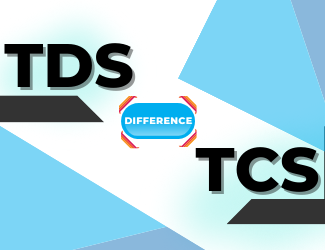The tax collected by the government is of two types i.e. Indirect & Direct taxes. While Direct taxes apply to the income that is being earned by any individual or corporate, on the other hand, Indirect taxes are those which are imposed on the sale of goods and services. In the case of Direct taxes, the liability of tax needs to be done by the assesses directly to the government while in the case of Indirect the seller collects and pays the tax to the government. And TCS & TDS are also the part of indirect taxes that are often confused with each other as both of these are levied at the point of the origin of income.
This Article contains the following topics:
Table of Contents
ToggleWhat is TDS?
- Tax deducted at source or TDS, as its name suggests, is an indirect way of collecting the tax, and it leads to the collection of revenue at the recipient’s income. It integrates the phrase of ‘pay as you earn’ and ‘make collection when it will be earned’, which shows the result of, the collection of tax is brought forward.
- As per the Income Tax Act, any payment on certain expenses, which falls under the provision of TDS, are to be paid after the deduction of defined percentage.
- In short, at the time of making payment, the payer contains a certain percentage of the amount and that needs to be deposited with the government. In this way, the tax on income is charged in advance, rather than on a recent date and the recipient will get the net amount, i.e. after TDS.
- Some examples of expenses for which TDS is charged are salary, casual income, interest on securities, rent payment, fees payment, and payment of commission or brokerage, and so on.
What is TCS?
- In India, on the sale of certain products, a tax is collected by the seller or company at prescribed rates from the buyer of the specified category of bought products, called as Tax collected at source or TCS. The seller then submits the tax collected from the buyer to the government and issues a TCS certificate to the buyer, for which the buyer of such goods will get credit.
- Such items include Tendu leaves, Liquor (alcoholic nature), Scrap, Parking lot, Toll Plaza, Bullion (over two lakhs), Jewelry (over five lakhs), and so on.
- The rate of TCS is based on the nature of the products.
Difference Between TDS and TCS
| Parameters | TDS | TCS |
| Definition | Tax deducted on those payments which has been made by companies and individuals if the payment exceeds a defined limit. | TCS is collected by a seller when selling some defined goods to a buyer. |
| What does it apply to? | It applies to Salary, Rent, Brokerage, Professional fee, Commission, Interest, etc. | TCS is collected on the sale of goods such as Scrap, Timber, Mineral Wood, Ttendu leaves, etc |
| When does it apply? | On payments above a certain limit | On the sale of certain goods (except those used for manufacturing or production) |
| Who does it apply to? | A person making a specified payment over and above a certain limit will lead to the deduction of TDS | A person selling certain goods can collect TCS according to the Income Tax Act, 1961 |
Slabs For TDS Tax Rate
| Type of payment | TDS rate |
| Salary | As per applicable income tax slab |
| Lottery, crossword puzzle, or horse race winnings above ₹10,000 | 30% |
| Single payment worth ₹30,000 or aggregate payment of ₹1 lakh to a contractor | 1% for individual or HUF, 2% for others |
| Sale commission of Lottery ticket or brokerage charges above ₹15,000 | 5% |
| Rent exceeds ₹2,40,000 paid for the land, building, plant, or machinery | 10% for land and building, 2% for plant and machinery |
| Purchase of immovable property above ₹50 lakhs | 1% |
TDS Rate Chart FY 2021-22
Slabs For TCS Tax Rate
| Types of goods | TCS rate (in %) |
| Alcohol or Liquor | 1% |
| Timber wood under a leased forest | 2.5% |
| Tendu leaves | 5% |
| Forest produce excluding Tendu leaves and timber | 2.5% |
| Scrap | 1% |
| Metals including lignite, Coal, Iron ore | 1% |
| Purchase of motor vehicle above ₹10 lakh | 1% |
| Mine, Quarry, Parking lot, Toll Plaza | 2% |
Consequences of The Failure To Deposit TDS or TCS With The Government
If an individual fails to submit or collect tax, he/she would have to face certain legal consequences. This includes a penalty of an equal amount of tax not collected or deducted. The individual may also be imprisoned for 3 to 7 years along with a fine as defined.
Individuals may also need to pay interest, in the event of failure to deposit TDS or TCS. The interest will be paid on the monthly tax amount which was eligible for deductions. The interest will be calculated for every month from the date of which tax was eligible for deductions to the date it is finally deducted (1%) or paid (1.5%) to the government in the case of TDS. For TCS, the rate of interest is fixed at 1%.
Conclusion
TDS is referring to the tax which is deducted on a payment made by a company to an individual, in case the amount exceeds a specified limit where TCS referring to the tax which is collected by sellers while selling some specified category of goods to the buyers. TDS deduction is eligible on payments such as salaries, rent, professional fee, brokerage, commission, etc.
FAQs
[sp_easyaccordion id=”5843″]








































